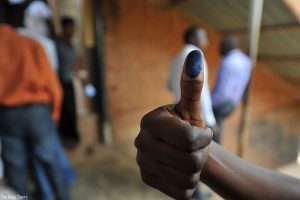Twenty-three years have passed since the 1994 Rwandan genocide, and the decades since have shaped Rwanda into a nearly unrecognizable country. The genocide seems, at first glance, to be a distant and painful memory. The capital of Kigali has transformed into a vibrant urban hub, complete with five star hotels and immaculate streets. Educational initiatives and a skyrocketing tourism industry are reshaping the nation. For many, especially those living outside of Rwanda, the genocide seems to be a historical event, locked firmly in the past. But while decades have passed since the 100 days during which at least 800,000 Tutsi and moderate Hutu were killed, the past doesn’t seem so far away to many Rwandans. The personal tolls, be they loss of family members or lasting emotional scars, still remain.

These dynamics between a painful past and a push for progress often come to the forefront at moments of transition, and this has held true during the 2017 presidential election which took place on August 4th. The months leading up to the election were marked by domestic and international attention, with a particular focus on the effects of a 2015 constitutional referendum. This referendum allowed President Paul Kagame to run for office again, despite previously instated term limits. Kagame has led Rwanda since the waning days of the genocide; as the leader of the Rwandan Patriotic Front, Kagame took power after ousting the genocidal government, and officially becoming president in 2000. Kagame’s win was all but guaranteed.
This election has been a topic of heavy critique, particularly from many journalists and scholars outside of Rwanda. Along with questionable polls, many critics present concerns about press freedom, free speech, and political dissent. Perhaps most controversial in this election cycle was the candidacy of Diane Rwigara, an outspoken opponent of the current government. The day after she officially announced her candidacy, nude photos of Rwigara appeared online, which her campaign asserted were fraudulent. Her name was kept off of the ballot after the election board claimed that she did not reach the required 600 valid signatures, although her campaign said she had submitted over 1,000. This is not the first time such concerns have been risen; such controversies often take place regarding notable political contenders, as severe as allegations of assassination. These criticisms paint a troubling picture, with many fearful that corruption or a lack of a democratic transition may lead Rwanda, once again, down a dark path.
However, there is more to the story that these critiques often do not address. On a recent trip to Kigali, I was able to speak to young Rwandans about their views on the future of the nation and the path the country has taken post-genocide. Many spoke about the pride they felt in Rwanda’s progress and the stark contrast to their childhoods, where any semblance of peace seemed nearly impossible. One university student I spoke with summed it up well, “We still have a long journey… this is continuous… We have the task to teach continuously and endlessly.” Students I spoke with often echoed his sentiments: Rwanda is imperfect, and the path to true stability is a long one, but there is hope in the direction the nation was headed. This understanding is not universal for Rwandans, but for many, the calls for unity and reconciliation, paired with the promise of stability and hope in the aftermath of such destruction, are worthwhile pursuits, even in the face of problems.
Rwanda is not a perfect nation and not a perfect democracy – no country in this world is either. And while many have brought up worthwhile criticisms that shall continue to be central challenges for the nation for generations to come, many Rwandans continue to express optimism in the face of these concerns. This election represents another moment for reflection, both within Rwanda, as well as in the international community.
Brooke Chambers is a PhD student in the University of Minnesota’s Sociology Department. She is broadly interested in the 1994 genocide in Rwanda, bystander dynamics, and understandings of policy and transitional justice in response to genocide and mass atrocity.

Comments